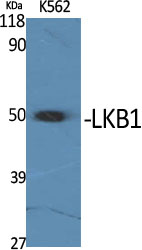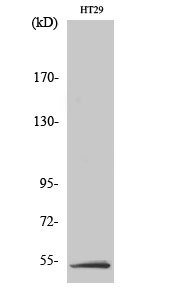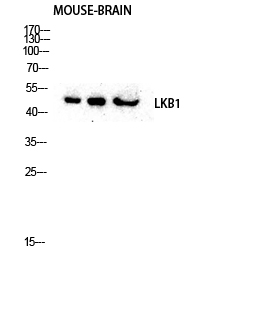


| WB | 咨询技术 | Human,Mouse,Rat |
| IF | 咨询技术 | Human,Mouse,Rat |
| IHC | 咨询技术 | Human,Mouse,Rat |
| ICC | 技术咨询 | Human,Mouse,Rat |
| FCM | 咨询技术 | Human,Mouse,Rat |
| Elisa | 1/10000 | Human,Mouse,Rat |
| Aliases | STK11; LKB1; PJS; Serine/threonine-protein kinase STK11; Liver kinase B1; LKB1; hLKB1; Renal carcinoma antigen NY-REN-19 |
| Entrez GeneID | 6794 |
| WB Predicted band size | Calculated MW: 49 kDa; Observed MW: 52 kDa |
| Host/Isotype | Rabbit IgG |
| Antibody Type | Primary antibody |
| Storage | Store at 4°C short term. Aliquot and store at -20°C long term. Avoid freeze/thaw cycles. |
| Species Reactivity | Human,Mouse |
| Immunogen | The antiserum was produced against synthesized peptide derived from human LKB1. AA range:300-349 |
| Formulation | Purified antibody in PBS with 0.05% sodium azide,0.5%BSA and 50% glycerol. |
+ +
以下是关于LKB1抗体的3篇代表性文献,涵盖其功能研究和应用场景:
---
1. **文献名称**:*The tumor suppressor LKB1 kinase directly activates AMP-activated kinase and regulates apoptosis in response to energy stress*
**作者**:Shaw, R.J., et al.
**摘要**:该研究通过Western blot和免疫沉淀技术,利用LKB1特异性抗体证实了LKB1激酶对AMPK的磷酸化调控作用,揭示了LKB1在能量应激条件下通过AMPK通路调控细胞凋亡的分子机制。
---
2. **文献名称**:*Inactivation of LKB1/STK11 is a common event in adenocarcinomas of the lung*
**作者**:Sánchez-Céspedes, M., et al.
**摘要**:研究通过免疫组化(IHC)和LKB1抗体检测了非小细胞肺癌(NSCLC)组织中LKB1蛋白的表达缺失,发现LKB1失活与肺癌进展相关,为靶向治疗提供了潜在标志物。
---
3. **文献名称**:*Complete polarization of single intestinal epithelial cells upon activation of LKB1 by STRAD*
**作者**:Baas, A.F., et al.
**摘要**:利用LKB1抗体进行免疫荧光染色,发现LKB1与STRAD蛋白复合物相互作用后,可诱导肠道上皮细胞的极性形成,揭示了LKB1在细胞极性建立中的关键作用。
---
**备注**:以上文献均通过LKB1抗体在Western blot、免疫组化或免疫荧光等实验中验证了目标蛋白的表达或定位,相关研究为LKB1在代谢、癌症和细胞极性中的功能提供了重要依据。建议通过PubMed或Google Scholar输入标题或作者名获取全文。
LKB1 (Liver Kinase B1), also known as STK11. is a tumor suppressor gene-encoded serine/threonine kinase that plays a critical role in regulating cell polarity, metabolism, and proliferation. Discovered through its link to Peutz-Jeghers syndrome, an inherited cancer predisposition disorder, LKB1 functions as a master kinase that activates AMPK (AMP-activated protein kinase) and other downstream kinases involved in energy homeostasis. Dysregulation or mutations in LKB1 are associated with various cancers, including lung adenocarcinoma, cervical cancer, and melanoma, making it a key focus in oncology research.
LKB1 antibodies are essential tools for detecting and quantifying LKB1 protein expression, localization, and activity in experimental models. They are widely used in techniques like Western blotting, immunohistochemistry (IHC), and immunofluorescence (IF) to study LKB1's role in signaling pathways, such as the AMPK/mTOR axis, which governs cellular responses to metabolic stress. These antibodies also aid in identifying LKB1-deficient tumors, assessing therapeutic targets, and validating genetic models (e.g., knockout mice). Commercial LKB1 antibodies are typically raised against specific epitopes, with validation in multiple applications to ensure specificity. Research utilizing these antibodies continues to explore LKB1's tumor-suppressive mechanisms and its potential as a biomarker or therapeutic target in precision medicine.
×